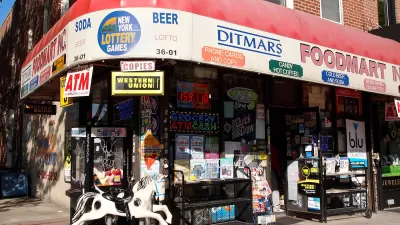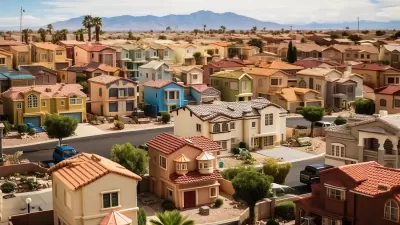The neighborhood is the basic building block of human society, and successful efforts to make the world a better place often start right there, says Jay Walljasper.
The neighborhood is the basic building block of human society, and successful efforts to make the world a better place often start right there.
This might strike you as archaic, a throwback to the time when men wore fedoras and everyone walked to church on Sunday mornings. Yet the age of globalization actually makes neighborhoods more important than ever. After spending all day connecting with Facebook friends in Madrid, Manila and Maquoketa, even the most zealous virtual globetrotters are eager for face-to-face contact in a real place, like a local coffee shop, pub or park.

Neighborhoods - whether in cities, suburbs or small towns - are the level of social organization at which people interact most regularly and naturally, providing a ready-made forum for tackling serious issues. Even if the neighbors abhor our political views or artistic tastes, we nonetheless share a bond. When a crisis occurs (a rash of burglaries) or opportunities arise (plans to revitalize the park), these are the people who stand beside us to make improvements for the future.
In an era when what's wrong in the world can seem complicated and daunting, neighborhoods offer hope that we can still make a difference. What's overwhelming at the international, national or even municipal level often can be fixed closer to home, without large sums of money or strong political connections. And in an era of instantaneous global communications, no great idea stays in one place for long:
- The Dudley Street neighborhood in Boston's beleaguered Roxbury ghetto, for instance, was dogged by all the usual urban ills: poverty, crime, drugs, unemployment, racial discrimination, inadequate public services, deteriorating housing and poor schools. These problems - inextricably linked with global economics and national policies - felt insurmountable. But the residents of Dudley Street, assisted by a small grant from a local foundation, forged a vision for their future and went to work. They created a town common, built a community center, started youth programs, launched a farmers market and promoted locally owned businesses. These efforts sparked a new sense of possibility for the community and brought genuine improvements to the lives of Dudley Street residents, which has inspired similar efforts around the country.
- Grandmothers at the Yesler Terrace public housing project in Seattle drove drug dealers out of their community by camping out in lawn chairs at a street corner notorious for the crack trade. They simply sat there knitting, and shamed the dealers into moving elsewhere. The idea that ordinary people can take back the streets has been successfully tested in Chicago, Minneapolis and other communities.
- In Porto Alegre, Brazil (population 1.3 million), local officials enlisted the wisdom of neighborhood residents to figure out how to best spend everyone's tax money. Citizens gathered in neighborhood assemblies to decide what was most needed in their part of town, and then elected representatives to advise the city council on budget priorities. This "participatory budgeting" process has been credited with lowering unemployment, improving sanitary conditions and revitalizing Porto Alegre's poorest neighborhoods. More than 1,200 cities across the world have now adopted the idea.
This all goes to show, when you get together with the neighbors to solve a problem or seize an opportunity, almost anything is possible. That's because the people who live in a particular locale are the experts on that place, with the wisdom and commitment to get things done. And when you add up all that's happening in neighborhoods everywhere, it amounts to significant progress. You truly can begin to change the world on your own block.

Alabama: Trump Terminates Settlements for Black Communities Harmed By Raw Sewage
Trump deemed the landmark civil rights agreement “illegal DEI and environmental justice policy.”

Planetizen Federal Action Tracker
A weekly monitor of how Trump’s orders and actions are impacting planners and planning in America.

The 120 Year Old Tiny Home Villages That Sheltered San Francisco’s Earthquake Refugees
More than a century ago, San Francisco mobilized to house thousands of residents displaced by the 1906 earthquake. Could their strategy offer a model for the present?

In Both Crashes and Crime, Public Transportation is Far Safer than Driving
Contrary to popular assumptions, public transportation has far lower crash and crime rates than automobile travel. For safer communities, improve and encourage transit travel.

Report: Zoning Reforms Should Complement Nashville’s Ambitious Transit Plan
Without reform, restrictive zoning codes will limit the impact of the city’s planned transit expansion and could exclude some of the residents who depend on transit the most.

Judge Orders Release of Frozen IRA, IIJA Funding
The decision is a victory for environmental groups who charged that freezing funds for critical infrastructure and disaster response programs caused “real and irreparable harm” to communities.
Urban Design for Planners 1: Software Tools
This six-course series explores essential urban design concepts using open source software and equips planners with the tools they need to participate fully in the urban design process.
Planning for Universal Design
Learn the tools for implementing Universal Design in planning regulations.
Clanton & Associates, Inc.
Jessamine County Fiscal Court
Institute for Housing and Urban Development Studies (IHS)
City of Grandview
Harvard GSD Executive Education
Toledo-Lucas County Plan Commissions
Salt Lake City
NYU Wagner Graduate School of Public Service





























